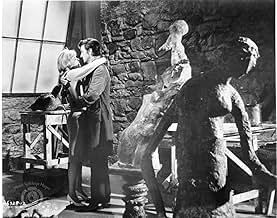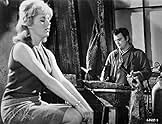IMDb-BEWERTUNG
5,7/10
9462
IHRE BEWERTUNG
Ein Axtmörder stört eine trauernde Familie bei einer Gedenkfeier in ihrem Schloss.Ein Axtmörder stört eine trauernde Familie bei einer Gedenkfeier in ihrem Schloss.Ein Axtmörder stört eine trauernde Familie bei einer Gedenkfeier in ihrem Schloss.
Handlung
WUSSTEST DU SCHON:
- WissenswertesFrancis Ford Coppola was assisting Roger Corman on the set of Schnelle Autos und Affären (1963) in Ireland. Corman allowed Coppola to use the same set, crew, and actors Luana Anders, William Campbell, and Patrick Magee for this film if he could shoot around the shooting schedule of Corman's film.
- PatzerWhen Louise goes into the pond after stripping to bra and panties, her panties are tan or light brown, yet in the underwater sequence they are black.
- Zitate
Louise Haloran: It's nice to see her enjoying herself for a change. The mood around this place isn't good for her.
Richard Haloran: Well, she may be right.
Louise Haloran: Especially an American girl. You can tell she's been raised on promises.
- Alternative VersionenThe original UK cinema version was cut by the BBFC to edit some of the gore from the murder scenes, including the decapitation, and various shots of dead bodies. The cuts were restored in all later UK prints.
- VerbindungenEdited into Elvira's Horror Classics (2004)
- SoundtracksHe's Caught
(uncredited)
Written by Arthur "Buddy" Fowler
Performed by Buddy and the Fads
Ausgewählte Rezension
Back in the early 60s, filmmaker Francis Ford Coppola was taking his first steps as a director, and after directing two "Nudie Cuties" (his very first two works), he began working with legendary producer Roger Corman as an assistant in several tasks such as dialog director, actor and finally working in the sound department of Corman's 1963 film, "The Young Racers". It was while filming this movie in Ireland when Coppola finally convinced Corman to allow him to make his first "legitimate" film: "Dementia 13", a low-budget horror film using the same locations and most of the cast of Corman's movie. Impressed by the script that Coppola and writer Jack Hill devised, gave Coppola free reign over the film and went back to the America, leaving all set for the debut of a man who would become one of the most important directors of the 70s and 80s.
Louise Haloran (Luana Anders) has a problem, her husband John (Peter Read) has died and therefore legally she is unable to claim any inheritance if John's mother dies. In order to retain her part in the testament, Louise decides to make everyone believe that John is still alive and pretending he was sent to New york to work, making him unable to accompany her to the family annual Memorial service they do for John's younger sister Kathleen in Ireland. at her arrival, everything seems to work out fine at first, but John's older brother Richard (WIlliam Campbell) begins to suspect that something is wrong. However, soon this becomes Louise' lesser problem, as something bigger and morbid seems to be going on inside the dark corridors of Harlan's Castle.
"Dementia 13" was written mostly by Coppola in a few days, but after Corman allowed them to continue with the project, Jack Hill helped Coppola to finish the script. The story is basically a mixture of traditional Gothic horror with elements of the slasher sub-genre that was in its early stages during those years ("Dementia 13" shows a lot of influence from Hitchcock's "Psycho"), and while it is indeed a bit messy and contrived at first sight, it does deliver an interesting mystery and good doses of suspense. It's not the most original movie ever (not even for its time), but it's very noticeable that Coppola was not going for the easy route of showing shocks ("lots of sex and violence" as he supposedly promised to Corman) and actually attempts to built a thrilling story of intrigues and madness.
While the plot may not be the film greatest strength, the direction by Coppola is surprisingly very good for a debut as he shows a raw display of the talent that would take him to the top in the future years. Giving a great use to the Irish castle that serves as location to the film, Coppola creates a nice atmosphere of dread and well, dementia, that fills the film with ominous power and gives it a personality of its own. Despite his limited resources (even for Corman's standards), he manages to come up with some good (although sparse) special effects that look impressive when one considers the shoestring budget he had to work with. Of course, "Dementia 13" is not really a great or remarkable film, but it's very good for a first time director and it's also really obvious that this is where Coppola learned many things about his craft.
Overall the cast does an effective job and manage to carry the film without too many problems. Luana Anders as Louise Harlan was probably at the top of her game and really shows that she is more than a pretty face. William Campbell as Richard Haloran is also excellent in his performance, although a little over the top at times. The film's best performances are given by Eithne Dunne and Patrick Magee, who as the unstable Lady Haloran and her Doctor respectively, give the film a dignity and a class uncommon in other similar movies. Magee is easily the highlight of the film, as he transforms what otherwise would be a two-dimensional character into a full fledged character with his charm and enormous talent.
This movie is a quite good example of how the cinema was evolving in the 60s, as the style and overall tone feel very fresh and young; however, those expecting to see another of Coppola's masterpieces in "Dementia 13" will be sorely disappointed. The movie's biggest problem is the somewhat messy script, that not only feels a bit too derivative from "Psycho" in some moments, but it also can become confusing and tedious at times. Fortunately, the cast does a very good job (considering the limitations) in solving this and along with Coppola's original direction literally save the movie from being a failure.
"Dementia 13" has gained a good reputation over the years, and while most of it is probably due to Coppola's later success as a director, it's hard to deny that there is real raw talent in the making of the film. Personally, I think that the best way to appreciate this early Coppola movie is to go without expectations and be willing to enjoy the ride. A very good, albeit flawed, horror movie. 6/10
Louise Haloran (Luana Anders) has a problem, her husband John (Peter Read) has died and therefore legally she is unable to claim any inheritance if John's mother dies. In order to retain her part in the testament, Louise decides to make everyone believe that John is still alive and pretending he was sent to New york to work, making him unable to accompany her to the family annual Memorial service they do for John's younger sister Kathleen in Ireland. at her arrival, everything seems to work out fine at first, but John's older brother Richard (WIlliam Campbell) begins to suspect that something is wrong. However, soon this becomes Louise' lesser problem, as something bigger and morbid seems to be going on inside the dark corridors of Harlan's Castle.
"Dementia 13" was written mostly by Coppola in a few days, but after Corman allowed them to continue with the project, Jack Hill helped Coppola to finish the script. The story is basically a mixture of traditional Gothic horror with elements of the slasher sub-genre that was in its early stages during those years ("Dementia 13" shows a lot of influence from Hitchcock's "Psycho"), and while it is indeed a bit messy and contrived at first sight, it does deliver an interesting mystery and good doses of suspense. It's not the most original movie ever (not even for its time), but it's very noticeable that Coppola was not going for the easy route of showing shocks ("lots of sex and violence" as he supposedly promised to Corman) and actually attempts to built a thrilling story of intrigues and madness.
While the plot may not be the film greatest strength, the direction by Coppola is surprisingly very good for a debut as he shows a raw display of the talent that would take him to the top in the future years. Giving a great use to the Irish castle that serves as location to the film, Coppola creates a nice atmosphere of dread and well, dementia, that fills the film with ominous power and gives it a personality of its own. Despite his limited resources (even for Corman's standards), he manages to come up with some good (although sparse) special effects that look impressive when one considers the shoestring budget he had to work with. Of course, "Dementia 13" is not really a great or remarkable film, but it's very good for a first time director and it's also really obvious that this is where Coppola learned many things about his craft.
Overall the cast does an effective job and manage to carry the film without too many problems. Luana Anders as Louise Harlan was probably at the top of her game and really shows that she is more than a pretty face. William Campbell as Richard Haloran is also excellent in his performance, although a little over the top at times. The film's best performances are given by Eithne Dunne and Patrick Magee, who as the unstable Lady Haloran and her Doctor respectively, give the film a dignity and a class uncommon in other similar movies. Magee is easily the highlight of the film, as he transforms what otherwise would be a two-dimensional character into a full fledged character with his charm and enormous talent.
This movie is a quite good example of how the cinema was evolving in the 60s, as the style and overall tone feel very fresh and young; however, those expecting to see another of Coppola's masterpieces in "Dementia 13" will be sorely disappointed. The movie's biggest problem is the somewhat messy script, that not only feels a bit too derivative from "Psycho" in some moments, but it also can become confusing and tedious at times. Fortunately, the cast does a very good job (considering the limitations) in solving this and along with Coppola's original direction literally save the movie from being a failure.
"Dementia 13" has gained a good reputation over the years, and while most of it is probably due to Coppola's later success as a director, it's hard to deny that there is real raw talent in the making of the film. Personally, I think that the best way to appreciate this early Coppola movie is to go without expectations and be willing to enjoy the ride. A very good, albeit flawed, horror movie. 6/10
Top-Auswahl
Melde dich zum Bewerten an und greife auf die Watchlist für personalisierte Empfehlungen zu.
- How long is Dementia 13?Powered by Alexa
Details
Box Office
- Budget
- 40.000 $ (geschätzt)
- Laufzeit1 Stunde 15 Minuten
- Farbe
- Sound-Mix
- Seitenverhältnis
- 1.66 : 1
Zu dieser Seite beitragen
Bearbeitung vorschlagen oder fehlenden Inhalt hinzufügen



























